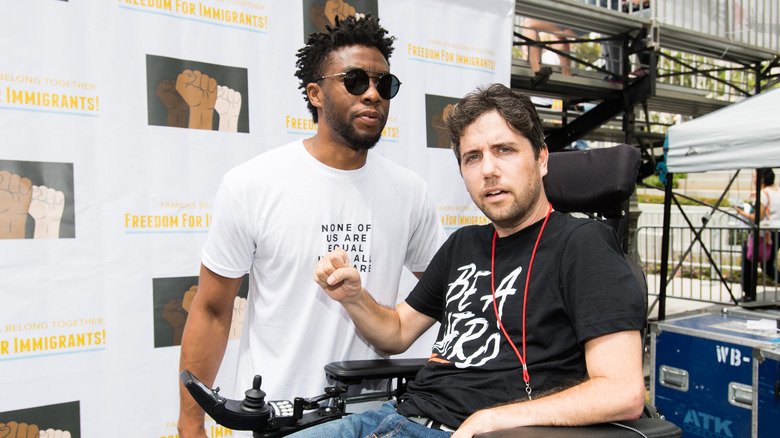What We Learned About Chadwick Boseman's Health After His Death
2020 was an unforgettable year. It was unforgettable in the loss faced on a global scale, in the upheaval that frightened nations, and in the personal sacrifices and strain everyone faced. It is impossible to name every loss faced over the course of the year. But for many, there is one that stood out not only because it was the loss of a brilliant star, but because the loss seemed to come with no warning. On August 28, 2020, Chadwick Boseman died at the age of 43.
As fans — and everyone outside of an extremely close circle — would soon learn, Boseman's death was not a shock to the actor, nor to his family. The award winning playwright, actor, and producer had been receiving cancer treatments for four years, following a diagnosis in 2016 (via The New York Times).
After Boseman's death, a statement released on his Twitter and other social media platforms revealed that the star had initially been diagnosed with stage 3 colon cancer. The cancer eventually progressed to stage 4, ultimately resulting in Boseman's death. Fans and colleagues were stunned, most completely unaware of his struggles or even the details about the condition that took him far too soon.
What is colon cancer?
The CDC describes colon cancer — also known as colorectal cancer — as the second-most lethal form of cancer that affects all sexes. It is often preceded by small abnormal growths in the colon or the rectum, sometimes both. These growths are known as polyps and all too often they can become cancerous, eventually spreading from the polyp into the colon or rectum itself.
Both the colon and the rectum are integral parts of the digestive system, and developing cancer in either creates serious complications. The colon is better known as the large intestine, while the rectum connects the large intestine to the anus, making it possible for the body to remove waste products.
The area's importance to digestion and waste removal prompts many doctors to suggest high-risk patients reduce the amount of animal fats they eat while increasing their fiber intake. As the CDC explains, however, there is little hard data on risk reduction. There are many ongoing studies in the field, but early and regular screenings remain the only strong preventative recommendation. Current guidelines recommend starting regular screenings at the age of 45 but high-risk populations may want to start sooner. Such high risk populations, it turns out, seem to be grouped by ethnicity.
Ethnicity is an important factor
As stated on BlackDoctor.Org, African Americans make up a surprisingly large percentage of colon cancer cases, roughly 20 percent more than white Americans. The site goes to say that some of this difference can be laid at the feet of socioeconomic factors, differences in care access or quality, and different access to screening services. The difference is still so stark, however, that researchers are looking into it.
The disparity is underscored by the CDC cancer statistics, broken down by demographics. For every 100,000 people, 47.5 Black men were diagnosed with colon cancer compared to 40.7 white men. Black women were diagnosed at a rate of 35.3 cases for every 100,000 people while white women were only diagnosed with 31.4 cases. The distinction doesn't seem that large at this scale. But when the entire population is accounted for, those extra cases add up.
Age is also a factor, with people between the ages of 50 and 54 being diagnosed at almost twice the rate of people between the ages of 40 and 44. Unfortunately, as in Chadwick Boseman's case, a younger age is not always a guarantee of protection. And it is for this reason that higher-risk populations may want to start screening before the CDC's recommended age of 45. Early screening is key, as Boseman's brother Kevin urged in 2020.
Symptoms and screenings
Like his brother, Kevin Boseman also faced a cancer diagnosis. And, in October of 2020, he took to Instagram to share that he had reached his second year in remission (via Yahoo). BlackDoctor.org shared more of Kevin Boseman's post, including his advice that anyone get checked who feels that something is off. "Tomorrow is not promised," he wrote. And it is something he and his brother know all too well.
There are some symptoms that people can look for if they feel they are at a higher risk for colorectal cancer. The CDC lists them but is also quick to point out that cancer often comes with no symptoms and is only found after a routine screening. Occasionally, however, some symptoms do manifest. These can include a feeling of constipation even after going to the bathroom, diarrhea, blood on or in stool, and changes in a person's bowel movements.
Screenings are still key, even if these symptoms are not present, particularly as many of these symptoms can also be caused by other conditions. Inflammatory bowel conditions like IBS have similar symptoms and are themselves a risk factor for developing colorectal cancer. Other conditions like diabetes, obesity, and a family history of colon cancer can also raise a person's risk level, as can overuse of alcohol or tobacco (via the Mayo Clinic).
Treatment options are harsh
Once a polyp has been detected, there are several treatment options available. Some are noninvasive or only moderately invasive. Others require major surgery. All of them, however, take a toll on the body. And as the statement on Boseman's Twitter account highlighted, he worked around his cancer treatments.
Boseman underwent surgeries and chemotherapy all while filming some of his career's biggest pictures. And he did it all with the same quiet dignity that his colleagues remember him for, many of them unaware at the time that he had cancer.
While the star's specific treatments remain understandably private, chemotherapy has well-known side effects. The American Cancer Society lists fatigue, anemia, infection, pain and numbness in limbs, appetite changes, nausea and vomiting, weight changes, and issues with focus or mental clarity as just a few of the treatment's side effects. Any one of these conditions would make a work day difficult for the average person. For Chadwick Boseman, they were obstacles to be overcome and he did so with such intensity that his performances during his treatment period led many of his films to critical acclaim and widespread popularity.
Chadwick Boseman's legacy
While Chadwick Boseman's most well-known legacy will be that of King T'Challa, Marvel's Black Panther and king of Wakanda, the star left behind another kind of legacy. In their piece on his death, the BBC remembered the 2018 commencement speech Boseman delivered to that year's Howard University graduates. Their struggles, he said, had prepared them to make the world a better place.
Boseman understood their struggles. He had been in their exact seats 18 years prior at his own graduation from Howard. And he went on to do exactly what he urged 2018's graduates to do. He did all he could to make the world a better place. As showcased on The Hype, Boseman worked with and donated to numerous charities including St. Jude's, and made a donation of more than $4 million in PPE equipment to hospitals in predominantly Black communities during the height of the COVID-19 pandemic.
Chadwick Boseman was an amazing man who used his fame to better the lives of those in need. He centered his life on his family and his community, giving back where he could and speaking up when he felt his voice should be heard. His legacy makes it all the more fitting that Howard University honored his life and his work in the Chadwick A. Boseman College of Fine Arts. It is a school where students will pursue the passions that drove Boseman and, perhaps, help change the world as he did.






